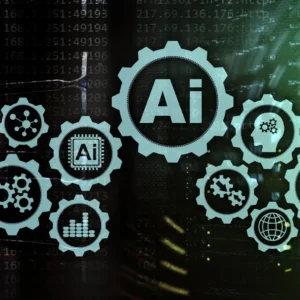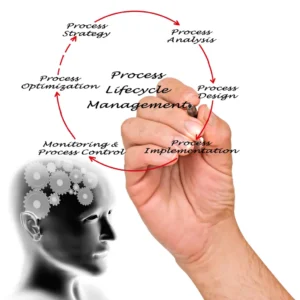
Maximizing Efficiency
The Comprehensive Benefits of Implementing AI Tools for Intelligent Process Automation (IPA)
Embarking on the journey of Intelligent Process Automation (IPA) by integrating AI tools unveils myriad benefits that resonate throughout organizational dynamics.
In an era where efficiency, productivity, and strategic focus are paramount, the infusion of AI into business processes becomes a game-changer. This article delves into the profound advantages encapsulated under the keyword “Benefits of Implementing AI Tools for Intelligent Process Automation (IPA)”.
Each facet contributes to a tapestry of operational excellence, from optimizing routine tasks and resource allocation to reducing errors and enhancing decision-making. Beyond cost reduction and scalability, the transformative impact extends to customer satisfaction, epitomized by faster response times and personalized interactions.
As we navigate the intricate terrain of business optimization, the strategic deployment of AI tools emerges as a technological imperative and a strategic roadmap for organizations aspiring to thrive in the contemporary landscape.
Maximizing Efficiency
Businesses use AI tools for Intelligent Process Automation (IPA) to pursue operational excellence. This strategic move offers a myriad of advantages, with a primary focus on maximizing efficiency. Let’s delve into the specifics of how AI contributes to this goal.
Automation of Repetitive Tasks:
AI tools excel in liberating human potential by taking on mundane and repetitive tasks. The result? Employees can redirect their energy towards more intricate and imaginative aspects of their roles. This enhances job satisfaction and fosters an environment ripe for innovation.
Faster Processing:
One of the standout features of AI algorithms is their ability to process information at a pace beyond human capabilities. This accelerated processing power translates into faster decision-making and task completion. Time-sensitive processes that once relied on human speed can now benefit from the expeditious nature of AI-driven automation.
24/7 Availability:
AI systems redefine the concept of operational hours. Unlike their human counterparts, AI operates round the clock without breaks, holidays, or weekends. This continuous execution ensures that processes are not bound by time constraints. It’s a game-changer for industries where uninterrupted operations are critical.
Implementing AI tools in IPA introduces a paradigm shift in how businesses operate. The automation of repetitive tasks not only optimizes workforce efficiency but also positions human resources where they can contribute the most value. The speed at which AI processes information injects agility into decision-making, which is crucial in today’s fast-paced business environment. Furthermore, the 24/7 availability of AI aligns with the demand for non-stop operations, providing a competitive edge in the market.
Integrating AI tools emerges as a cornerstone as businesses navigate efficiency. The impact is tangible — from liberated human potential to expedited processes and the reassurance of continuous operations. The benefits of implementing AI tools for IPA in maximizing efficiency are not just theoretical; they are a transformative reality for businesses embracing the future of intelligent automation.
Productivity Gains
Efficiency is not the only forte of AI tools in Intelligent Process Automation (IPA). Businesses leveraging AI witness substantial gains in productivity. Let’s explore the fundamental aspects shaping this productivity surge.
Enhanced Decision-Making:
AI’s prowess in data analysis brings a revolutionary dimension to decision-making. With the ability to process vast amounts of data swiftly, AI tools become invaluable assets in extracting valuable insights. This empowers businesses to make informed decisions, steering them toward strategic development and success.
Reduced Error Rates:
Automation introduces a safeguard against human errors. By taking on repetitive tasks, AI minimizes the likelihood of mistakes, ensuring higher accuracy. The ripple effect is felt across operations, contributing to the overall quality and reliability of work. Businesses can thus minimize the costs associated with error correction and rework.
Streamlined Workflows:
AI’s optimization capabilities extend to the very core of business processes. Through intelligent analysis and adaptation, AI can streamline workflows. This means procedures are not just automated but optimized for efficiency. The result is a more agile and responsive operational framework where tasks seamlessly align for maximum output.
Implementing AI tools in IPA transcends the realm of mere automation; it catalyzes a significant leap in productivity. The ability to make data-driven decisions enhances strategic planning, making businesses more adaptive in dynamic markets. Reduced error rates bring about a reliability quotient, fostering confidence in output quality. The streamlined workflows are akin to an orchestration of efficiency, where each component seamlessly integrates for optimal productivity.
As businesses navigate the productivity landscape, adopting AI tools emerges as a linchpin. The benefits are palpable — from informed decision-making and error mitigation to the orchestration of streamlined workflows. The productivity gains realized through implementing AI tools for IPA are not just incremental; they redefine the dynamics of modern business operations.
Cost Reduction
Cost reduction is a pivotal advantage as businesses integrate AI tools into Intelligent Process Automation (IPA). The impact is discernible across multiple dimensions.
Labor Cost Savings:
AI’s ability to handle repetitive tasks translates into a reduction in the human workforce required for those activities. This results in substantial savings on labour costs. Automated processes carry out tasks efficiently, freeing human resources for roles where creativity and critical thinking are paramount.
Error Reduction:
Automation serves as a shield against errors. By minimizing mistakes in routine tasks, AI significantly reduces the costs associated with error correction and rework. The financial benefits extend beyond operational efficiency to the bottom line, contributing to cost-effectiveness.
Faster Processing:
The accelerated processing speed of AI plays a pivotal role in cost reduction. In time-sensitive processes, swift task completion directly correlates with savings. AI’s ability to expedite operations enhances efficiency and mitigates potential financial losses associated with delayed or overdue tasks.
In the landscape of cost management, adopting AI tools for IPA emerges as a strategic imperative. Labour cost savings, driven by task automation, free up financial resources for strategic investments. Error reduction is a financial safeguard, minimizing costs tied to rectifying mistakes. The faster processing capabilities of AI align with the economic principle of time as a resource, amplifying the cost-effectiveness of operations.
Implementing AI tools in IPA is a technological upgrade and a pragmatic financial decision. The cost reduction benefits permeate through the entire operational spectrum, optimizing resource allocation and fortifying the financial resilience of businesses. As organizations navigate the path of fiscal prudence, integrating AI tools proves to be a pivotal ally in achieving sustainable cost efficiencies.
Resource Optimization
Resource optimization takes centre stage as AI tools seamlessly integrate into Intelligent Process Automation (IPA).
Resource Allocation:
AI’s analytical prowess extends to resource utilization patterns, facilitating optimal allocation for maximum efficiency. Businesses benefit from precisely aligning resources with operational needs, minimizing waste and enhancing productivity.
Scalability:
Automation, a hallmark of AI, offers a unique advantage in scalability. Processes can be adjusted easily to handle varying workloads without proportional increases in human resources. This adaptability ensures operational continuity, even in fluctuating demand scenarios.
Task Prioritization:
AI brings a strategic edge by prioritizing tasks based on urgency and importance. Critical activities are promptly addressed, preventing bottlenecks and ensuring a streamlined workflow. This intelligent task management enhances efficiency and contributes to overall operational resilience.
Incorporating AI tools for IPA transforms the traditional paradigm in the resource management landscape. Resource allocation becomes a finely tuned orchestration, optimizing efficiency and minimizing excess. Scalability, a key pillar, empowers businesses to navigate market dynamics without a proportional increase in workforce.
Task prioritization emerges as a linchpin, aligning operations with strategic goals. By leveraging AI’s ability to discern urgency, businesses can ensure that vital tasks receive the attention they deserve. This strategic prioritization enhances efficiency and fortifies the organizational response to dynamic market conditions.
Integrating AI tools in IPA is not just about automation; it’s a strategic move towards resource intelligence. The benefits ripple across resource allocation, scalability, and task prioritization, enhancing the adaptive capacity of businesses. As organizations chart their course for operational excellence, the role of AI in resource optimization becomes a defining factor in achieving sustainable success.
Improved Customer Satisfaction
Elevating customer satisfaction becomes a reality as AI tools seamlessly integrate into Intelligent Process Automation (IPA).
Faster Response Times:
Automation’s swiftness translates directly into faster response times, a cornerstone of improved customer service. Quick and efficient responses enhance customer satisfaction, fostering loyalty and positive brand perception.
Personalization:
AI’s analytical capabilities extend to customer data, enabling personalized experiences. Tailored interactions meet individual needs and create a sense of connection, enhancing overall customer satisfaction. This personal touch contributes to lasting customer relationships.
In the pursuit of customer-centricity, the incorporation of AI tools in IPA stands out. Faster response times reflect a commitment to timely service, a critical factor in customer satisfaction. The efficiency gained through automation resonates with customers, signalling a brand’s dedication to their needs.
Personalization, powered by AI, goes beyond generic interactions. Businesses create a unique and memorable customer experience by understanding and responding to individual preferences. This tailored approach fosters satisfaction, loyalty, and positive word-of-mouth, all pivotal in today’s competitive business landscape.
As organizations prioritize customer satisfaction, the role of AI tools in IPA becomes a strategic imperative. The benefits of faster response times and personalized interactions contribute to short-term satisfaction and lay the foundation for enduring customer relationships. AI is a powerful ally in the journey towards customer-centric excellence, enhancing every touchpoint and interaction.
Innovation and Strategic Focus
Unleashing innovation and strategic focus emerge as a pivotal outcome when AI tools integrate into Intelligent Process Automation (IPA).
Freeing up Human Capital:
Automating routine tasks liberates human potential, redirecting employees toward innovative and strategic roles. This shift is instrumental in fostering overall organizational growth and competitiveness.
In the landscape of organizational dynamics, integrating AI tools in IPA transcends mere efficiency. The strategic release of human capital from routine tasks heralds a new era of innovation. Unburdened by mundane responsibilities, employees can channel their creativity and critical thinking towards endeavours that propel the organization forward.
As organizations navigate the path of innovation, AI becomes a catalyst.
The benefits extend beyond task automation; they redefine the very nature of work. When businesses let their employees focus on strategic aspects, it encourages innovation. It makes them more agile and forward-thinking in the competitive market.
Integrating AI tools in IPA is not just about streamlining processes; it’s about unlocking human potential for strategic endeavours. The ripple effect is felt in every facet of organizational growth, from product innovation to enhanced service delivery. In the ever-evolving landscape of business, the strategic deployment of AI becomes synonymous with staying ahead, driving innovation, and securing a competitive edge.
Conclusion
In conclusion, the transformative power of implementing AI tools for Intelligent Process Automation (IPA) resonates across diverse facets of organizational excellence. The benefits are profound, from maximizing efficiency by automating repetitive tasks to realizing productivity gains with enhanced decision-making, reduced error rates, and streamlined workflows. The cost reduction achieved through labour savings, error mitigation, and expedited task completion reinforces the financial prudence of integrating AI into business processes.
Moreover, resource optimization, encompassing strategic resource allocation, scalability, and intelligent task prioritization, elevates operational efficiency. The impact further enhances customer satisfaction by ensuring faster response times and personalized interactions. The liberation of human capital for innovation and strategic focus underscores the forward-thinking nature of AI integration.
Ultimately, the comprehensive benefits of AI tools in IPA redefine the business operations landscape. The synergistic interplay between technology and human capabilities positions organizations for immediate efficiency gains and sustained growth, adaptability, and competitiveness in a dynamic market. Embracing the era of intelligent automation is a technological evolution and a strategic imperative for businesses aspiring to thrive.
Related Articles
- Choosing the Right Automation Tool in 7 Steps
- A 9-Step Guide to IPA Implementation: Energise Your Operations
- Navigating the Roadblocks of IPA – The Top 9 Challenges
- AI in Intelligent Process Automation – Unleash the Power of AI
- 9 IPA Examples in Small-Scale Industries
- Power of Intelligent Business Process Automation – Efficiency
- AI Business Process Management: Unleashing the Power
- Business Process Management with AI Integration
- AI for Reengineering Business Processes
- Hyperautomation: Redefining BPM with AI
- The Role of AI in Business Process Modelling
- AI-driven Customer Onboarding – Unleash the Power of AI
- Effective Process mapping in Intelligent Process Automation
- Intelligent Process Automation Adoption – The Best Strategy Guide
- TechInfra in IPA: A Comprehensive Guide
- Elevating Intelligent Automation with Continuous Improvement
- Comprehensive Approach to Cost-Benefit Analysis in IPA
- Vendor Selection in IPA – Comprehensive Guide
- Implementing Agile in Intelligent Process Automation (IPA)
- Scalability and Integration in Intelligent Process Automation
- Cognitive Automation in IPA: Innovating Ethical Efficiency
- Mastering Symphony: Bot Development in IPA Unveiled
- UI/UX Mastery in IPA: Elevating Automation Experiences
- Compliance and Security in IPA – A Guide Ensuring Trust
- Impact of Performance Monitoring and Analytics in IPA
- Driving Success: Data Management in IPA
- Crucial Role: Documentation in IPA Triumph
- Optimizing IPA – Continuous Improvement Strategies























